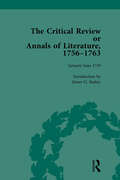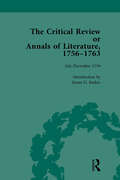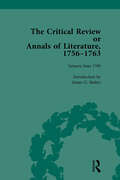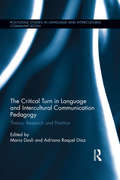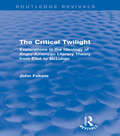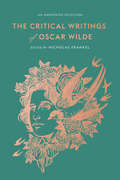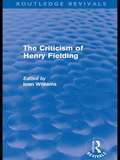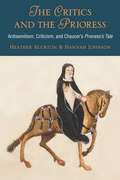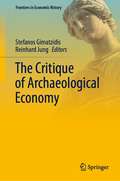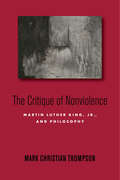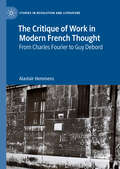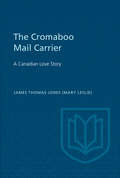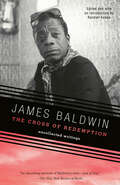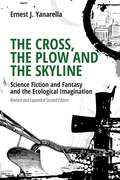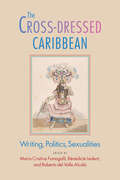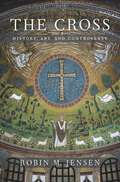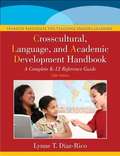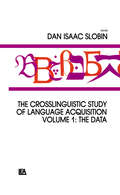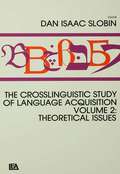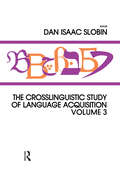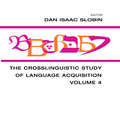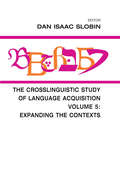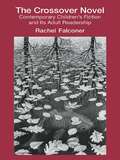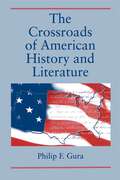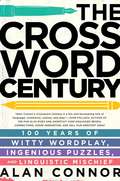- Table View
- List View
The Critical Review or Annals of Literature, 1756-1763 Vol 7
by James G BaskerThe "Critical Review" reflects the political, scientific and literary debate of the times. The journal was edited for its first seven years by Tobias Smollett and reflected the slashing, combative style and intellectual range of its editor. This 16-volume set reproduces this journal.
The Critical Review or Annals of Literature, 1756-1763 Vol 8
by James G BaskerThe "Critical Review" reflects the political, scientific and literary debate of the times. The journal was edited for its first seven years by Tobias Smollett and reflected the slashing, combative style and intellectual range of its editor. This 16-volume set reproduces this journal.
The Critical Review or Annals of Literature, 1756-1763 Vol 9
by James G BaskerThe "Critical Review" reflects the political, scientific and literary debate of the times. The journal was edited for its first seven years by Tobias Smollett and reflected the slashing, combative style and intellectual range of its editor. This 16-volume set reproduces this journal.
The Critical Turn in Language and Intercultural Communication Pedagogy: Theory, Research and Practice (Routledge Studies in Language and Intercultural Communication)
by Adriana Raquel Díaz Maria DasliThis edited research volume explores the development of what can be described as the ‘critical turn’ in intercultural communication pedagogy, with a particular focus on modern/foreign language education. The main aim is to trace the realisations of this critical turn against a background of unequal power relations, and to illuminate the role that radical culture educators can play in the making of a more democratic and egalitarian social order. The volume takes as a starting point the idea that criticality draws on a number of intellectual traditions, which do not always focus on social and political critique, and argues that because ideological hegemony impacts on the meanings that people create and share, intercultural communication pedagogy ought to locate itself within wider socio-political contexts. With reference points drawn from critical and transnational social theory, critical pedagogy and intercultural theory, contributors to this volume provide readers with powerful ways that show how this can be achieved, and together assess the impact that their understanding of criticality can make on modern/foreign language education. The volume is divided into three major parts, namely: ‘theorising critically’, ‘researching critically’ and ‘teaching critically’.
The Critical Twilight: Explorations in the Ideology of Anglo-American Literary Theory from Eliot to McLuhan (Routledge Revivals)
by John FeketeFirst published in 1977, this book was the first to map extensively the ideological typography of the Anglo-American tradition of literary theory. It interrogates, comprehensively and in detail, the assumptions and categorical development within critical ideas from I. A. Richards and T. S. Eliot, through John Crowe Ransom and the New Criticism, to Northrop Frye and Marshall NcLuhan. This analysis reveals the Anglo-American tradition of literary-cultural theory is most properly intelligible within the overall field of social consciousness as an ideology of progressive cultural rationalization. Against a background of ideological development since nineteenth-century Romanticism, John Fekete illuminates the boundaries of literary ideology in relation to the shapes and changes of modern culture and society.
The Critical Writings of Oscar Wilde: An Annotated Selection
by Oscar WildeAn authoritative edition of Oscar Wilde’s critical writings shows how the renowned dramatist and novelist also transformed the art of commentary.Though he is primarily acclaimed today for his drama and fiction, Oscar Wilde was also one of the greatest critics of his generation. Annotated and introduced by Wilde scholar Nicholas Frankel, this unique collection reveals Wilde as a writer who transformed criticism, giving the genre new purpose, injecting it with style and wit, and reorienting it toward the kinds of social concerns that still occupy our most engaging cultural commentators.“Criticism is itself an art,” Wilde wrote, and The Critical Writings of Oscar Wilde demonstrates this philosophy in action. Readers will encounter some of Wilde’s most quotable writings, such as “The Decay of Lying,” which famously avers that “Life imitates Art far more than Art imitates life.” But Frankel also includes lesser-known works like “The American Invasion,” a witty celebration of modern femininity, and “Aristotle at Afternoon Tea,” in which Wilde deftly (and anonymously) carves up his former tutor’s own criticism. The essays, reviews, dialogues, and epigrams collected here cover an astonishing range of themes: literature, of course, but also fashion, politics, masculinity, cuisine, courtship, marriage—the breadth of Victorian England. If today’s critics address such topics as a matter of course, it is because Wilde showed that they could. It is hard to imagine a twenty-first-century criticism without him.
The Criticism of Henry Fielding (Routledge Revivals)
by Ioan WilliamsFirst published in 1970, this selection of Fielding’s criticism is an important contribution to our understanding of Fielding and his age. It directs considerable light upon Fielding’s own critical views, with regard both to his own works and to eighteenth-century life and literature at large. The volume includes many of Fielding’s well-known and important statements on literature, society and morals, as well as many which are now difficult to obtain. The selection presents the full range of Fielding’s criticism, showing the relations between his statements concerning literature and his opinions on other matters, and drawing on the complete body of his work. The editor has provided a large-scale analytical introduction.
The Critics and the Prioress: Antisemitism, Criticism, and Chaucer's Prioress's Tale
by Hannah Johnson Heather BlurtonOf all the Canterbury Tales, Geoffrey Chaucer’s Prioress’s Tale, in which a young schoolboy is murdered by Jews for singing a song in praise of the Virgin Mary, poses a problem to contemporary readers because of the anti-semitism of the story it tells. Both the Tale’s anti-semitism and its “Chaucerianism”— its fitness or aptness as part of the Chaucerian canon—are significant topics of reflection for modern readers, who worry about the Tale’s ethical implications as well as Chaucer’s own implications. Over the past fifty years, scholars have asked whether the anti-semitism in the tale is that of the Prioress? Or of Chaucer the pilgrim? Or of Chaucer the author? Or, indeed, whether one ought to discuss anti-semitism in the Prioress’s Tale at all, considering the potential anachronism of expecting medieval texts to conform to contemporary ideologies. The Critics and the Prioress responds to a critical stalemate between the demands of ethics and the entailments of methodology. The book addresses key moments in criticism of the Prioress’s Tale—particularly those which stage an encounter between historicism and ethics—in order to interrogate these critical impasses while suggesting new modes for future encounters. It is an effort to identify, engage, and reframe some significant—and perennially repeated—arguments staked out in this criticism, such as the roles of gender, aesthetics, source studies, and the appropriate relationship between ethics and historicism. The Critics and the Prioress will be an essential resource for Chaucer scholars researching as well as teaching the Prioress’s Tale. Scholars and students of Middle English literature and medieval culture more generally will also be interested in this book’s rigorous analysis of contemporary scholarly approaches to expressions of anti-semitism in Chaucer’s England.
The Critique of Archaeological Economy (Frontiers in Economic History)
by Stefanos Gimatzidis Reinhard JungThis book studies past economics from anthropological, archaeological, historical and sociological perspectives. By analyzing archeological and other evidence, it examines economic behavior and institutions in ancient societies. Adopting an interdisciplinary perspective, it critically discusses dominant economic models that have influenced the study of past economic relations in various disciplines, while at the same time highlighting alternative theoretical trajectories. In this regard, the book’s goal is not only to test theoretical models under scrutiny, but also to present evidence against the rationalization of past economic behavior according to the rules of modern markets. The contributing authors cover various topics, such as trade in the classical Greek world, concepts of commodity and value, and management of economic affluence.
The Critique of Nonviolence: Martin Luther King, Jr., and Philosophy
by Mark Christian ThompsonHow does Martin Luther King, Jr., understand race philosophically and how did this understanding lead him to develop an ontological conception of racist police violence? In this important new work, Mark Christian Thompson attempts to answer these questions, examining ontology in Martin Luther King, Jr.'s philosophy. Specifically, the book reads King through 1920s German academic debates between Martin Heidegger, Rudolf Bultmann, Hans Jonas, Carl Schmitt, Eric Voegelin, Hannah Arendt, and others on Being, gnosticism, existentialism, political theology, and sovereignty. It further examines King's dissertation about Tillich, as well other key texts from his speculative writings, sermons, and speeches, positing King's understanding of divine love as a form of Heideggerian ontology articulated in beloved community. Tracking the presence of twentieth-century German philosophy and theology in his thought, the book situates King's ontology conceptually and socially in nonviolent protest. In so doing, The Critique of Nonviolence reads King's "Letter from a Birmingham Jail" (1963) with Walter Benjamin's "Critique of Violence" (1921) to reveal the depth of King's political-theological critique of police violence as the illegitimate appropriation of the racialized state of exception. As Thompson argues, it is in part through its appropriation of German philosophy and theology that King's ontology condemns the perpetual American state of racial exception that permits unlimited police violence against Black lives.
The Critique of Work in Modern French Thought: From Charles Fourier to Guy Debord (Studies in Revolution and Literature)
by Alastair HemmensWhat is work? Why do we do it? Since time immemorial the answer to these questions, from both the left and the right, has been that work is both a natural necessity and, barring exploitation, a social good. One might criticise its management, its compensation and who benefits from it the most, but never work itself, never work as such. In this book, Alastair Hemmens seeks to challenge these received ideas. Drawing on the new ‘critique-of-value’ school of Marxian critical theory, Hemmens demonstrates that capitalism and its final crisis cannot be properly understood except in terms of the historically specific and socially destructive character of labour. It is from this radical perspective that Hemmens turns to an innovative critical analysis of the rich history of radical French thinkers who, over the past two centuries, have challenged the labour form head on: from the utopian-socialist Charles Fourier, who called for the abolition of the separation between work and play, and Marx’s wayward son-in-law, Paul Lafargue, who demanded The Right to Laziness (1880), to the father of Surrealism, André Breton, who inaugurated a ‘war on work’, and, of course, the French Situationist, Guy Debord, author of the famous graffito, ‘never work’. Ultimately, Hemmens considers normative changes in attitudes to work since the 1960s and the future of anti-capitalist social movements today. This book will be a crucial point of reference for contemporary debates about labour and the anti-work tradition in France.
The Cromaboo Mail Carrier: A Canadian Love Story
by Douglas Lochhead James Thomas JonesA Canadian love story about Robbie Smith, a 19-year-old mail carrier travelling the old gravel roadway (now Highway 124) between Cromaboo (Erin) and Gibbeline (Guelph). One day on his travels he sees Miss Mary Paxton, an unwed lady, 14 years his senior. He falls in love with her. And so begins our tale.
The Cross of Redemption: Uncollected Writings (Vintage International Ser.)
by James BaldwinFrom one of the most brilliant and provocative literary figures of the past century—a collection of essays, articles, reviews, and interviews that have never before been gathered in a single volume.&“An absorbing portrait of Baldwin&’s time—and of him.&” —New York Review of BooksJames Baldwin was an American literary master, renowned for his fierce engagement with issues haunting our common history. In The Cross of Redemption we have Baldwin discoursing on, among other subjects, the possibility of an African-American president and what it might mean; the hypocrisy of American religious fundamentalism; the black church in America; the trials and tribulations of black nationalism; anti-Semitism; the blues and boxing; Russian literary masters; and the role of the writer in our society.Prophetic and bracing, The Cross of Redemption is a welcome and important addition to the works of a cosmopolitan and canonical American writer who still has much to teach us about race, democracy, and personal and national identity. As Michael Ondaatje has remarked, &“If van Gogh was our nineteenth-century artist-saint, Baldwin [was] our twentieth-century one.&”
The Cross, the Plow and the Skyline: Science Fiction and Fantasy and the Ecological Imagination (Revised and Expanded 2nd Edition)
by Ernest J. YanarellaThe apocalyptic, pastoral, and urban traditions have fundamentally shaped Western history and influenced American religion, culture, and politics. This book argues that these traditions have not only been decisive in giving form and substance to classic a
The Cross-Dressed Caribbean: Writing, Politics, Sexualities (New World Studies)
by Maria Cristina Fumagalli, Bénédicte Ledent, and Roberto del Valle AlcaláStudies of sexuality in Caribbean culture are on the rise, focusing mainly on homosexuality and homophobia or on regional manifestations of normative and nonnormative sexualities. The Cross-Dressed Caribbean extends this exploration by using the trope of transvestism not only to analyze texts and contexts from anglophone, francophone, Spanish, Dutch, and diasporic Caribbean literature and film but also to highlight reinventions of sexuality and resistance to different forms of exploitation and oppression.Contributors:Roberto del Valle Alcalá, University of Alcalá * Lee Easton, Sheridan College Institute of Technology and Advanced Learning * Odile Ferly, Clark University * Kelly Hewson, Mount Royal University * Isabel Hoving, Leiden University * Wendy Knepper, Brunel University * Carine Mardorossian, University at Buffalo, SUNY * Shani Mootoo * Michael Niblett, University of Warwick * Kerstin Oloff, Durham University * Lizabeth Paravisini, Vassar College * Mayra Santos-Febres, University of Puerto Rico, Río Piedras * Paula Sato, Kent State University * Lawrence Scott * Karina Smith, Victoria University * Roberto Strongman, University of California, Santa Barbara * Chantal Zabus, University of Paris 13
The Cross: History, Art, and Controversy
by Robin M. JensenThe cross stirs intense feelings among Christians and non-Christians alike. Robin Jensen takes readers on an intellectual and spiritual journey through the 2,000-year evolution of the cross as idea and artifact, illuminating the controversies and forms of devotion this central symbol of Christianity inspires.
The Crosscultural, Language, and Academic Development Handbook: A Complete K--12 Reference Guide (Fifth Edition)
by Lynne T. Diaz-RicoAn up-to-date edition of a bestseller, The Crosscultural, Language, and Academic Development Handbook, 5/e guides educators in promoting academic success for the culturally and linguistically diverse learners in today's classrooms. Designed specifically for mainstream classroom teachers, the book shows clearly how second-language acquisition affects learning, and presents an excellent treatment of cultural diversity and learning styles. Included is coverage of new applications for mobile learning; the Common Core Standards; Response to Intervention; English learners with autism; educating undocumented immigrants; involving family and the community to increase academic success; adapting for English learners with special needs; and more.
The Crosslinguistic Study of Language Acquisition Volume 1: the Data
by Dan Isaac SlobinAn essential handbook for professionals and advanced students in the field. Volume 1 contains comprehensive studies on the acquisition of 15 different languages (from ASL to Samoan) -- written by top researchers on each topic. Volume 2 concentrates on theoretical issues, emphasizing current linguistic and psycholinguistic research. Unique in its approach toward individual languages and in its comparative perspective, this book is a hallmark of a rapidly growing area of interdisciplinary, international research.
The Crosslinguistic Study of Language Acquisition: Volume 2: Theoretical Issues
by Dan Isaac SlobinSee Volume I (0-89859-367-0) for full description and TOC.
The Crosslinguistic Study of Language Acquisition: Volume 3
by Dan Isaac SlobinExtending the tradition of this series, which has become a standard reference work in language acquisition, this volume contains chapters on seven more languages, including a section on ergative languages. Languages in this volume include: Georgian; Greenlandic; K'iche Mayan; Warlpiri; Mandarin; Scandinavian and Sesotho.
The Crosslinguistic Study of Language Acquisition: Volume 4
by Dan Isaac SlobinContinuing the tradition of this series, which has become a standard reference work in language acquisition, Volume 4 contains chapters on three additional languages/language groups--Finnish, Greek, and Korean. The chapters are selective, critical reviews rather than exhaustive summaries of the course of development of each language. Authors approach the language in question as a case study in a potential crosslinguistic typology of acquisitional problems, considering those data which contribute to issues of general theoretical concern in developmental psycholinguistics and linguistic theory. Each chapter, therefore, provides the following: * Grammatical Sketch of Language. Brief grammatical sketch of the language or language group, presenting those linguistic facts which are relevant to the developmental analysis. * Sources of Evidence. Summary of basic sources of evidence, characterizing methods of gathering data, and listing key references. * Overall Course of Development. Brief summary of the overall course of development in the language or language group, giving an idea of the general problems posed to the child in acquiring a language of this type, summarizing typical errors, domains of relatively error-free acquisition, and the timing of acquisition--areas of the grammar that show relatively precocious or delayed development in crosslinguistic perspective. * Data. Specific developmental aspects of the language examined in depth, depending on each individual language and available acquisition data. * Conclusions. An interpretive summary of theoretical points raised above, attending to general principles of language development and linguistic organization suggested by the study of a language of this type, plus comparisons with development of other languages.
The Crosslinguistic Study of Language Acquisition: Volume 5: Expanding the Contexts
by Dan Isaac SlobinIn this final volume in the series, the contributors attempt to "expand the contexts" in which child language has been examined crosslinguistically. The chapters build on themes that have been touched on, anticipated, and promised in earlier volumes in the series. The study of child language has been situated in the disciplines of psychology and linguistics, and has been most responsive to dominant issues in those fields such as nativism and learning, comprehension and production, errors, input, and universals of morphology and syntax. The context has primarily been that of the individual child, interacting with a parent, and deciphering the linguistic code. The code has been generally treated in these volumes as a system of morphology and syntax, with little attention to phonology and prosody. Attention has been paid occasionally to the facts that the child is acquiring language in a sociocultural setting and that language is used in contexts of semantic and pragmatic communication. In addition, there has been a degree of attention paid to the interactions between language and cognition in the process of development. As for individual differences between children, they have been discussed in those studies where they could not be avoided, but such variation has rarely been the focus of systematic attention. Differences between individual languages have been of great interest, but these differences have not often been placed in a framework of systematic typological variation. And although languages and their grammars change over time, the focus of attention on the individual child learner has generally led to neglect of explanatory principles that are best found on the level of linguistic diachrony, rather than the level of innate ideas or patterns of learning and cognition in the individual child. The chapter authors seek to explore these neglected contexts in more depth.
The Crossover Novel: Contemporary Children's Fiction and Its Adult Readership (Children's Literature and Culture)
by Rachel Falconer"Highly recommended" by Choice While crossover books such as Rowling's Harry Potter series have enjoyed enormous sales and media attention, critical analysis of crossover fiction has not kept pace with the growing popularity of this new category of writing and reading. Falconer remedies this lack with close readings of six major British works of crossover fiction, and a wide-ranging analysis of the social and cultural implications of the global crossover phenomenon. A uniquely in-depth study of the crossover novel, Falconer engages with a ground-breaking range of sources, from primary texts, to child and adult reader responses, to cultural and critical theory.
The Crossroads of American History and Literature
by Philip F. GuraThe Crossroads of American History and Literature collects two decades' worth of the best-known essays of Philip F. Gura. Beginning with a definitive overview of studies of colonial literature, Gura ranges through such subjects in colonial American history as the intellectual life of the Connecticut River Valley, Cotton Mather's understanding of political leadership, and the religious upheavals of the Great Awakening. In the nineteenth century, he visits such varied topics as the history of print culture in rural communities, the philological interests of the Transcendentalist Elizabeth Peabody, the craft and business of the early Amerian music trades, and Thoreau's interest in exploration literature and in the Native American. Displaying remarkable sophistication in a variety of fields that, taken together, constitute the heart of American Studies, this collection illustrates the complexity of American cultural history.
The Crossword Century: 100 Years of Witty Wordplay, Ingenious Puzzles, and Linguistic Mischief
by Alan ConnorA journalist and word aficionado salutes the 100-year history and pleasures of crossword puzzles Since its debut in The New York World on December 21, 1913, the crossword puzzle has enjoyed a rich and surprisingly lively existence. Alan Connor, a comic writer known for his exploration of all things crossword in The Guardian, covers every twist and turn: from the 1920s, when crosswords were considered a menace to productive society; to World War II, when they were used to recruit code breakers; to their starring role in a 2008 episode of The Simpsons. He also profiles the colorful characters who make up the interesting and bizarre subculture of crossword constructors and competitive solvers, including Will Shortz, the iconic New York Times puzzle editor who created a crafty crossword that appeared to predict the outcome of a presidential election, and the legions of competitive puzzle solvers who descend on a Connecticut hotel each year in an attempt to be crowned the American puzzle-solving champion. At a time when the printed word is in decline, Connor marvels at the crossword’s seamless transition onto Kindles and iPads, keeping the puzzle one of America’s favorite pastimes. He also explores the way the human brain processes crosswords versus computers that are largely stumped by clues that require wordplay or a simple grasp of humor. A fascinating examination of our most beloved linguistic amusement—and filled with tantalizing crosswords and clues embedded in the text—The Crossword Century is sure to attract the attention of the readers who made Word Freak and Just My Type bestsellers.
